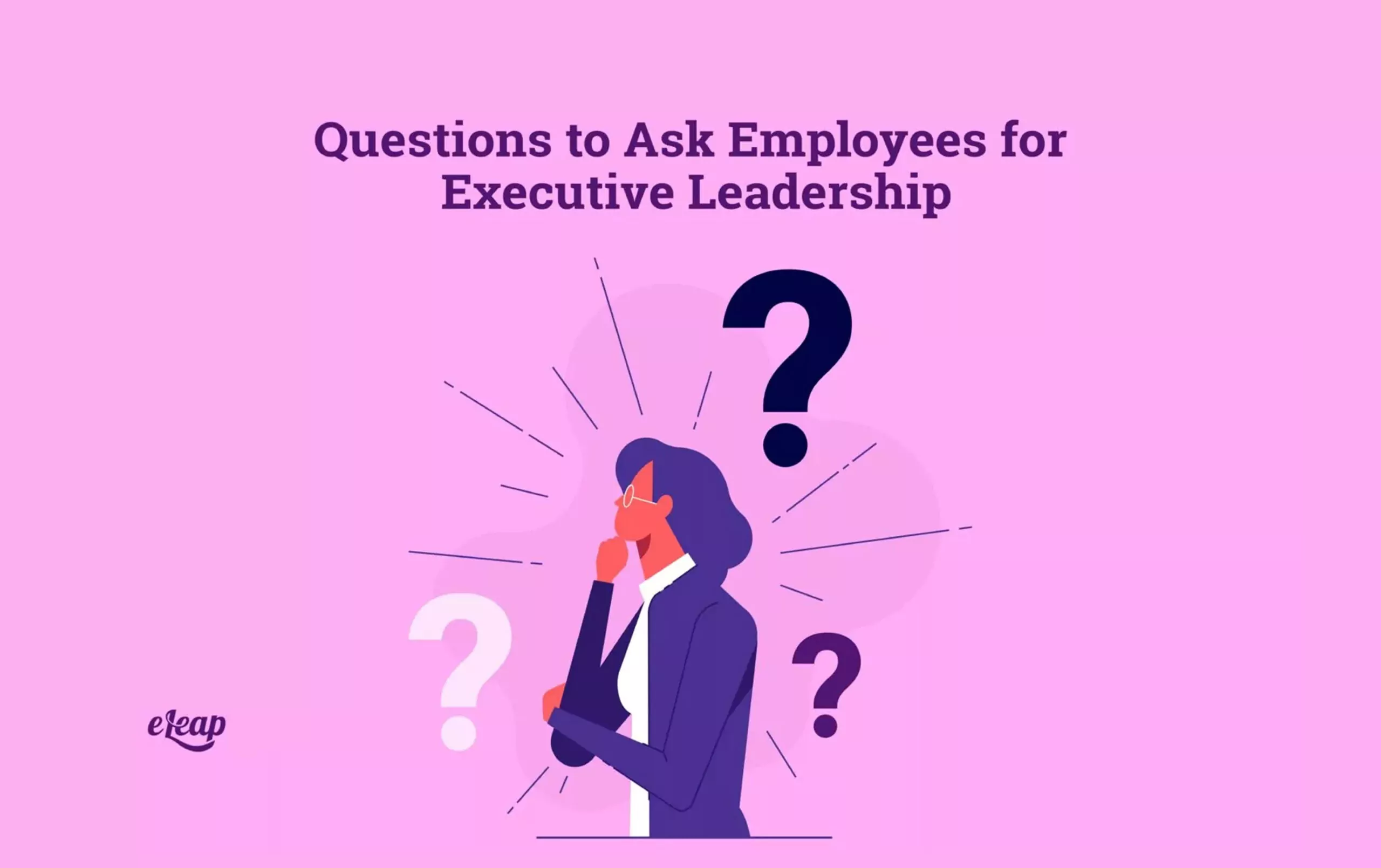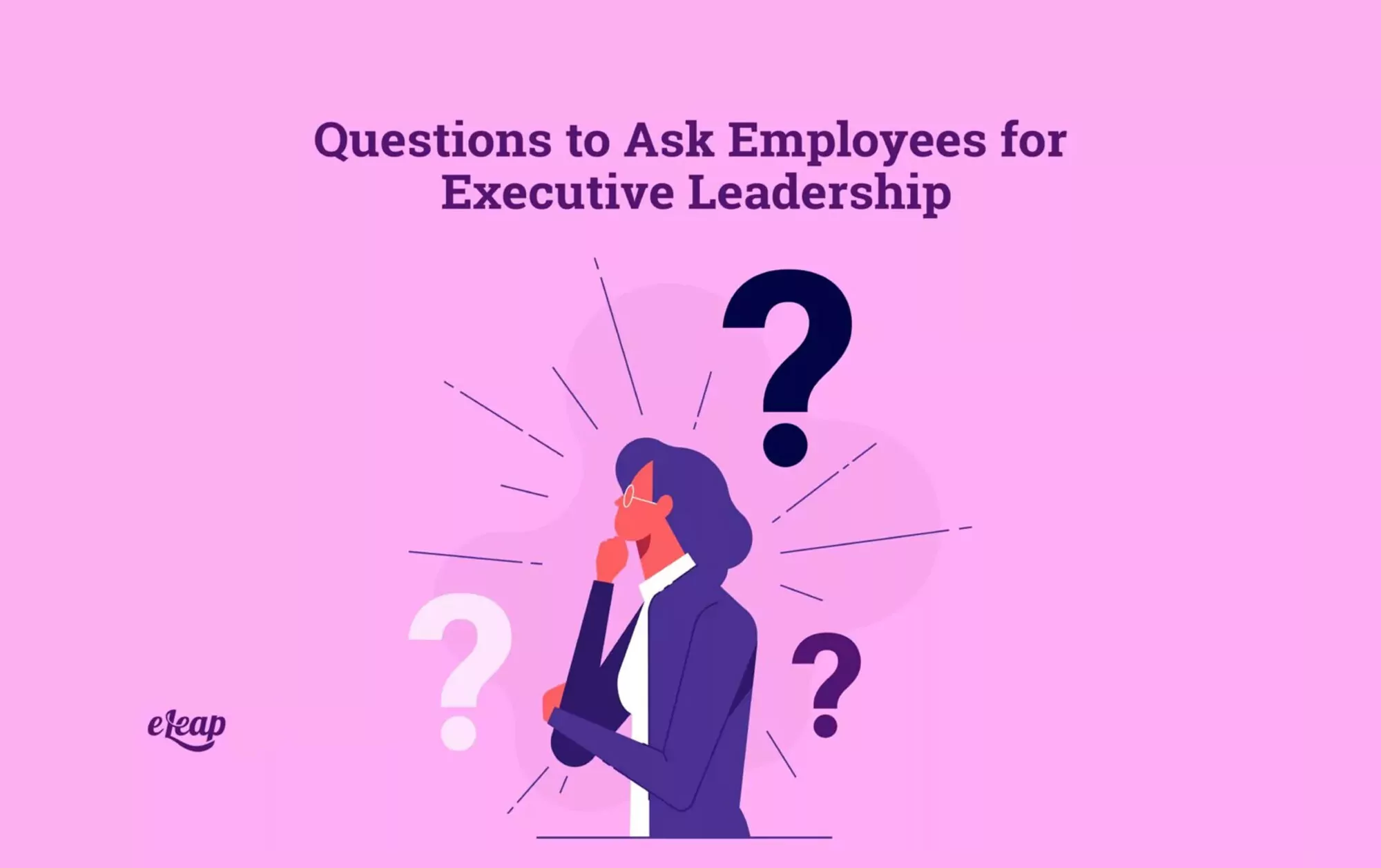Questions to Ask Employees for Executive Leadership

Being a manager is hard work, so we’ve gathered some of the most helpful questions to ask employees for executive leadership. A manager has a variety of responsibilities. Sometimes the day-to-day grind of management takes focus away from one of the most important jobs managers have – leadership.
Managers who take responsibility for the growth and development of their employees gain more success than those who only look at numbers and balance sheets. Yes, a manager’s job is often all-encompassing. Depending on the size and complexity of an organization. A manager might wear many hats. They have a lot on their plate. However, if time and energy are not devoted to building a strong successful workforce, they set themselves up for failure.
This post helps you find ways to build a better workforce by asking the right questions. Keep reading for a list of questions managers need to ask their employees. Getting honest answers to these questions helps you figure out which strategies work best for both you and your employees.

Why Communicating with Your Employees Is Essential
Managers find it especially difficult to cultivate success when they fail to communicate with their team members. Your employees are the ones who hold the reigns of your business. Their motivation, engagement, and satisfaction have a direct effect on every aspect of your company. Everything relies on their performance.
That’s why it’s so important for managers to foster open communication. Constructive conversations give managers insights into what’s working and what needs improvement. Furthermore, it lets managers know where situations that may need attention are arising. This way you can put out fires before they start burning.
When managers show a vested interest in their employees, those employees develop a sense of trust. Building trust and respect with team members is something that only comes with time and effort. It takes a long time to create and only a moment to destroy. Show your employees that you care about their success. And they will reward you.
These conversations are not reserved for performance reviews. These are questions that need to be a part of regular conversations with workers. Outreach and feedback gathering are important parts of leadership.
Questions to Ask Employees for Executive Leadership
What are some of your biggest wins lately?
The first question you ask needs to elicit a positive reaction. Employees need to understand that you’re coming from a place of encouragement and cooperation. This way they feel good about their achievements. They’re given the space and time to brag about their wins and feel a sense of pride and ownership in their work.
This question gives insight into which activities drive excitement and engagement. Use this information to generate ideas for how to create more scenarios that allow employees to thrive within their passion.
What are some struggles that you have encountered lately? What’s holding you back?
The second question is a follow-up to the conversation about “wins.” By allowing the employee a safe space to share their struggles, you create trust and openness. You have already shown the employee that you’re on their team by sharing in their successes. Now you need to demonstrate that you care about their continued success by allowing them to express their worries.
Be sure you pay close attention to their response. Actively listen to what they’re telling you. The worst thing you could do is ask an employee about their struggles and then not give their response your full attention. If they don’t feel like you’re engaged in the conversation, it may feel like you’re only placating them.
What do you need from the company, or me, to overcome your struggles?
Now that you’ve let the employee share their concerns, assist them in finding constructive ways to find solutions. It’s entirely possible that your employees already know what they need to succeed. Perhaps they just don’t feel like they’re receiving the tools or support that they require.
Do they need extra help? Is there training, skills, or knowledge that they’re lacking that makes their job harder? Is the company giving them access to all the resources they need to be successful? If the employee has a clear idea of what they need to be more successful, they will most likely tell you outright. If they seem to fumble the answer, offer some proactive solutions that might spark ideas.
What are some things the company can do differently that would make your job easier?
This question puts the power in the hands of your team members. Allowing them to offer ideas and solutions to everyday problems lets them know that you value their input. They feel ownership of their roles and performance when they know that the organization values their insight.
The processes and procedures of a business come from a group of Executive Leadership who will probably never have to use them. Most of their motivations come from consideration of the bottom line. However, employees are the ones who use and interact with these processes every day. Their feedback is extremely valuable and helps companies see things from a different perspective. Some of the best ideas come from the people at the bottom of an organization.
How are you feeling about your job lately? How high or low is your team morale?
A toxic work environment is detrimental to everyone. Many employees leave an organization rather than continue to work in a toxic environment. However, workplace drama is often whispered, not shouted. It’s not like a kindergarten classroom where everyone points fingers as soon as you walk into the room. Instead, it’s more likely that conversations about negativity and issues happen after you leave the room.
Give employees a safe space to share concerns about their working environment. This allows you access to information that you otherwise may never know. Is there an employee causing issues for everyone else? Is an employee struggling in silence for fear of retaliation? You can’t fix a problem until you’re aware it exists.
If you became CEO of the company tomorrow, what is the first thing you would change?
This question allows employees to step into your shoes and the shoes of upper-level executives. Employees are often full of ideas about how to better an organization. Many of their insights come from a place of purpose and passion, which is a great driver for creativity and big thinking.
Asking employees this question also gives you a clear picture of which employees would make great leaders in the future. Many companies promote from within. Your employees know your organization the best. When given opportunities to advance their careers. Employees are much more likely to stick with a company long-term.
What do you need from me? How can I help make your job more enjoyable?
These are two of the most important questions managers can ask an employee. They’re open-ended questions that allow the employee to speak about any needs they may have. They’re not specific to a particular task or project. They simply allow the employee the ability to tell you what they need.
When you let the employee know you truly care about their well-being, it builds trust. Let them tell you what they need and then let them know what steps you will take to facilitate their needs. Then, follow through, no matter how big or small.
How are things going in your personal life? Is there anything exciting happening or any personal struggle I can help you with?
The last questions take the focus off the working relationship and put it on your personal relationship. Every employee is a human being first and an employee second. They don’t leave work and revert the being themselves. They are themselves all the time, inside and outside of the workplace.
Showing an interest in their personal lives lets the employee know that you see them as an actual person. It helps them to see you as a human being as well. Many people have personal struggles in their lives that follow them to work every day. Let them know you care and are there for them no matter what.
Conclusion
These questions help managers find constructive ways to communicate with their employees. Asking direct questions lets you gather valuable feedback you might not otherwise have access to.
Furthermore, it helps the employees feel more supported and heard in the workplace. This leads to more engaged, satisfied, and happier employees, thereby adding to the success of the entire organization.
After every conversation, be sure to offer thanks and gratitude. Employees work hard for you every day. They appreciate the recognition for their efforts. When leaders work together with their teams instead of working above them, everyone benefits.